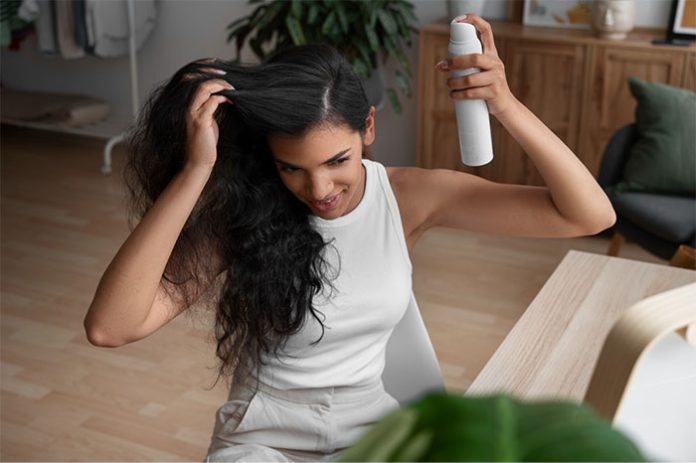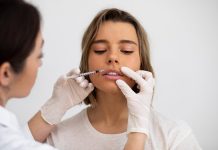We all dream of shiny, strong, and healthy hair, don’t we? It has a certain bounce to it that reflects your overall well-being. It also adds up to your confidence and self-worth.
However, achieving (and maintaining) healthy hair is quite difficult. From planning your diet to avoiding heat styling, you have to put in effort and make sacrifices. Then, there are tons of hair care products, creating confusion on which is the one for you.
Worry no more! We have put together expert healthy hair tips and professional hair tools that can help you maintain the vitality and beauty of your hair. Following these tried-and-tested methods is crucial to anyone seeking long, strong, and enviable locks.
Expert Healthy Hair Care Tips to Promote Hair Growth Faster
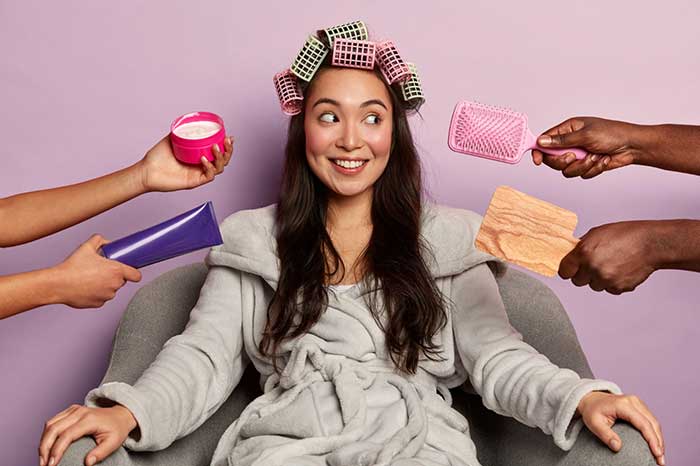
Below are some of the best hair care tips to grow and maintain luscious hair:
1. Shampoo Your Hair Properly
Healthy hair starts with a good shampoo match! If you have dry hair, look for a moisturizing shampoo. It has ingredients like shea butter or coconut oil. A clarifying or volumizing shampoo works well for oily and fine hair.
Also Read: Coconut Oil for Teeth Whitening
Also, time your hair washes properly. Oily scalps usually need a daily cleanse. While dry hair requires less frequent washes (every other day or twice a week) to retain hair’s natural oils.
Here are some tips to shampoo your hair effectively:
- Wash your scalp with lukewarm/ cold water. Using hot water can strip away hair’s natural moisture.
- Massage the shampoo into your scalp with your fingertips to loosen dirt and oil. The suds will naturally flow through the rest of your hair.
- When shampooing your hair, less is always more. A quarter-sized amount is enough to create a good lather for most hair types.
- Rinse thoroughly to remove all shampoo residue. If you feel build-up, you can go for a second cleanse. But a single good cleanse is usually enough.
2. Conditioning for Moisture
After shampooing, applying a suitable conditioner can prevent dryness and brittleness.
Conditioners are designed to nourish and hydrate hair, making it more manageable and less prone to damage. Avoid applying conditioner directly to the scalp, which can lead to build-up and weigh down your hair.
Instead, spread it on the hair evenly till the ends. You can use your fingers or a wide-toothed comb to spread it on all hairs. Rinse it off after some minutes as prescribed on the packaging. Always remember: Shampoo is for scalp and conditioner is for hair.
3. Heat Styling Precautions
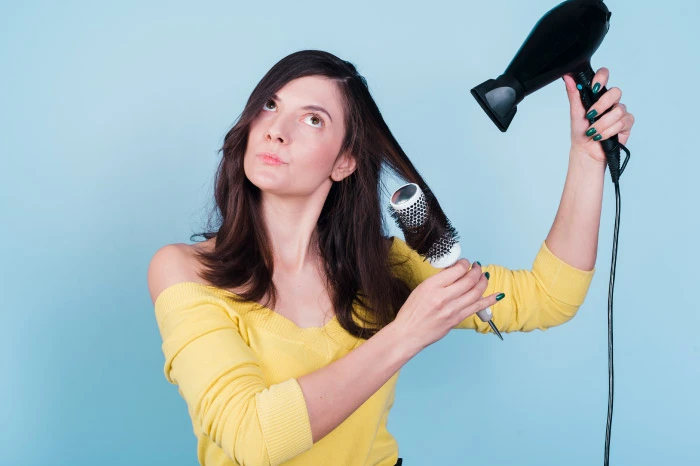
Heat styling tools, like flat irons and curling wands, can cause significant damage if used excessively or improperly. To maintain healthy hair, it’s important to use these tools wisely.
Try to limit the use of heat styling tools to a few times a week, and choose the lowest heat setting that is effective for your hair type.
4. Use Oils On Your Hair
Hair oils can be a wonderful way to give your hair a boost. They offer a variety of benefits, like nourishing dry hair and adding shine. Oiling can also help tame frizz and flyaways, promote scalp health by stimulating blood circulation, and even protect hair from heat styling damage.
To choose the right oil, consider your hair type:
- Dry hair: Argan, coconut, almond
- Oily hair: Jojoba, grapeseed
- Normal hair: Avocado, olive
Apply a small amount, focusing on the ends to avoid greasy roots. You can even apply hair oil before shampooing for deep conditioning or use a light amount on dry hair for extra benefits. With consistent use, you may see healthier, shinier, and more manageable hair.
5. Regular Hair Trims
Regular hair trims are essential for preventing split ends and promoting hair growth. Trimming your hair every 6-8 weeks is recommended to keep your hair looking healthy and strong. Split ends can travel up the hair shaft if left uncut, causing more damage and making your hair appear frizzy and dull.
Also Read: Short Hair Trends
6. Professional Haircare Tools
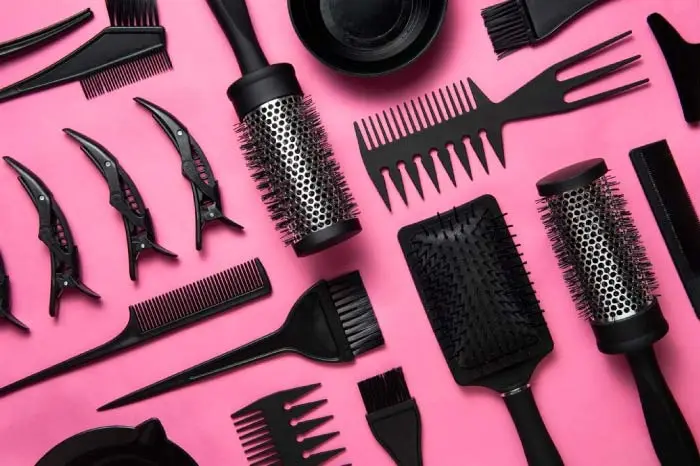
Professional haircare tools can greatly enhance the health and appearance of your hair. Tools like ionic hair dryers and ceramic flat irons are designed to minimize damage while providing excellent styling results. Ionic hair dryers reduce drying time and help to close the hair’s cuticle, locking in moisture and reducing frizz.
Ceramic flat irons distribute heat evenly, preventing hot spots that can damage hair. The majority of these products can be found with an easy online search.
7. Hair Masks to Maintain Hair Health
Hair masks not only moisturize your hair but also make them frizz-free and deeply nourished. There are tons of varieties according to the texture and nature of your hair. You can either make them at home or buy from the established brands.
Some common ingredients to look for in hair masks are olive oil, aloe vera, yogurt, argan oil, coconut water or oil, avocado oil, shea butter, Panthenol, Behentrimonium Chloride with honey, egg, and banana. They have different consistencies (clay-based, gel, and creamy) that benefit different hair types.
The best way to apply any hair mask is to shampoo your hair properly first. It will remove the dirt and oil from the scalp. Apply the hair mask and leave it for 5 minutes. Then rinse and air dry your hair.
8. Improve Your Diet

All the hair care tips aside, a balanced and healthy diet is crucial for hair and scalp health. Include proteins, zinc, vitamins, iron, and omega-3 fatty acids in your diet to strengthen your hair.
Proteins are the building block of hair. They prevent breakage, repair hair damage, and make your hair shiny. Include fish, lean meat, beans, and eggs in your diet to fill your protein quotient. Also, take up nuts like walnuts, cashews, and almonds. They contain zinc which is amazing for hair loss as it promotes hair follicle growth. A zinc supplement can also work.
Infuse a new life in your hair with omega-3 fatty acids, making them strong, shiny, and smooth. It is found in fish like salmon, yogurt, flax seed, and cottage cheese. Moreover, eat loads of leafy greens for iron, other vegetables, and fruits to have a well-rounded diet.
9. Be Gentle With Wet Hair
Be very careful when your hair is wet as it gets three times more vulnerable than dry hair. Do not rub a towel on wet hair; it can cause breakage. Also, avoid blow drying to minimize heat damage. Instead, use a smooth fabric like jersey cotton or Microfiber to absorb extra water and then air dry it.
Avoid combing hair when wet post-shower to prevent split ends and flyaways. If you have curly or wavy hair, use a wide-toothed wooden comb on wet strands coated in conditioner. A tooth comb soothes hair follicles and scalp and keeps hair healthy.
10. Sleep On A Silk Pillowcase

Another healthy hair tip is to sleep on a silk (or satin) pillowcase or wear a silk bonnet. Silk is a smoother fabric, causing less friction between your hair and pillowcase as you toss and turn at night. It prevents breakage, frizz, and tangles, keeping hair smooth and shiny.
Contrary to cotton, a silk pillowcase does not wick away moisture from your hair. It helps retain your hair’s natural oils, keeping it hydrated, healthy, and at its best.
Conclusion
Ensuring the health of your hair involves a holistic approach, combining effective care routines and appropriate tools. Remember, consistency is key! Remember, consistency is key! By incorporating the above top-notch professional healthy hair tips in your routine, you can transform your hair’s health, strength, and shine. Here’s to having beautiful, healthy hair!


